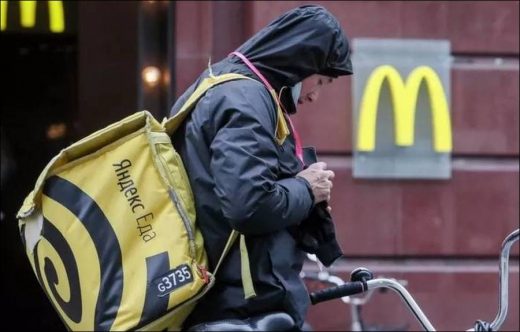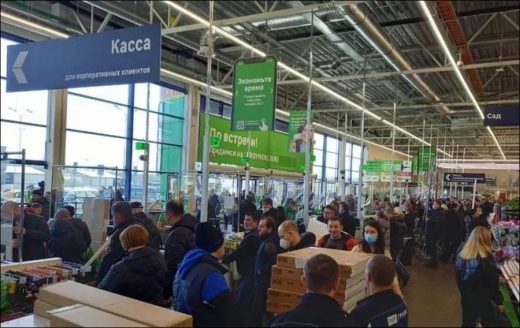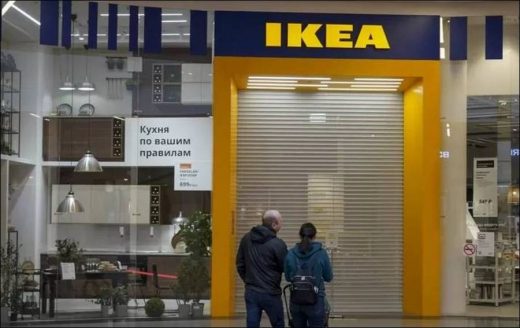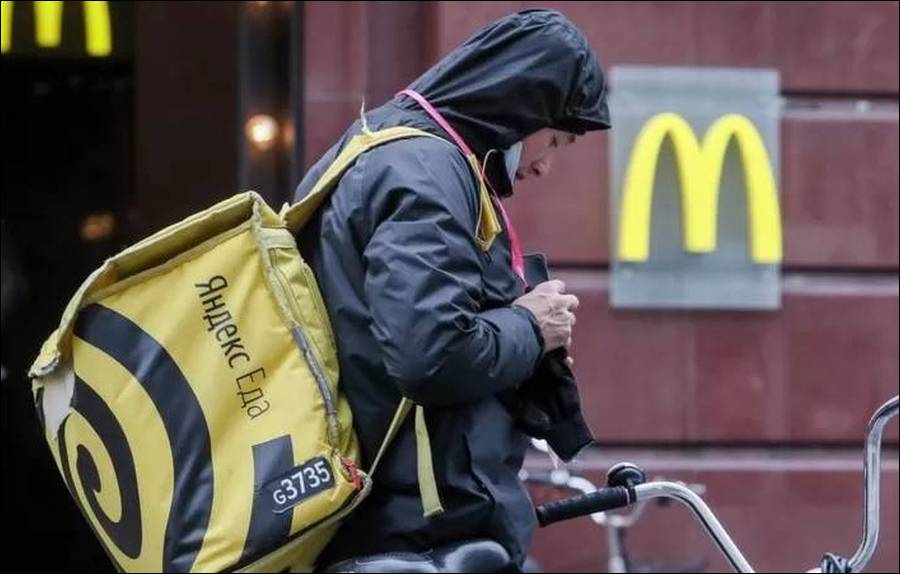The US, UK and EU countries began to impose unprecedented sanctions on Russia over the invasion of Ukraine, and hundreds of multinational companies stopped their activities in the country and withdrew.
The effects of these steps are now slowly starting to make itself felt. As the prices of basic necessities increase, many people are at risk of losing their jobs. Many people also began to feel a strong sense of isolation from the outside world.
We examined how daily life has changed due to the crisis. The names of all the people mentioned in this news have been changed and the dollar exchange rate equivalents have been calculated over the values at the time the news was prepared for publication.
Cooking oil, sugar and blood pressure medicine
Consumer prices jumped 2.2 percent in the first week of the occupation, with food prices among the biggest increases. Some shops have restricted the sale of basic foodstuffs, following news that people are stocking up in their homes. Drug sales are not sanctioned, but some medical products may not be available as leading shipping companies have stopped service.
The ruble has been depreciating rapidly since the Russian invasion of Ukraine began. This is causing many retail outlets to constantly raise prices.
Daria, who lives in the center of Moscow, says she has not yet seen an empty shelf. “There will be no shortage of food, but it will be more expensive,” he says. “How much more it will cost, I can’t even imagine, and I’m afraid to even think about it.”
“I bought 5500 rubles [$57] of food and necessities on February 20,” says Jan, an EU citizen and Moscow resident. “The things I bought that day are 8,000 rubles today. The price of milk has almost doubled in two weeks.”
Sugar and grain prices had already increased by 20 percent in February compared to last year. Tass, the official Russian news agency, announced that some retailers have agreed to limit the increase in the prices of the most basic foodstuffs to 5 percent. Some shops stopped selling basic foodstuffs such as flour, sugar and oil above a certain amount.
Daria says she’s stocking up on some items. “We bought 4 kilos of coffee, 4 liters of sunflower oil, 4 liters of olive oil and 4 bottles of whiskey,” he says. He also ordered three months’ worth of blood pressure medication. He says some drugs are already getting harder to find.
Latest iPhones and ‘last opportunity to taste imported product happiness’
The prices of some consumer goods have increased too much. While the prices of smartphones and televisions have increased by more than 10 percent, the average price of vacationing in Turkey is now 29 percent higher. Leading brands such as Apple, Ikea and Nike no longer sell their products in Russia.
Daria had been thinking about buying new computers for her family for a while, and seeing the prices keep increasing, she decided to do it as soon as possible:
“It was 70 thousand rubles at the beginning of February, but by the end of the month it had increased to 100 thousand rubles. We bought it at that price. Then it went up to 140 thousand rubles and the stocks in Moscow were exhausted.”
They didn’t get an iPhone charger but there was plenty of space. Apple announced on March 2 that it had ceased all direct selling activities in Russia. “I wish we had,” says Daria:
“Now it’s being joked. They say we got our last iPhones.”
Prices for new cars have skyrocketed. “We bought new filters and engine oil for the car. We’ll use them when it’s time for service,” says Daria.
“We were able to get them right in front of our eyes before prices doubled.”
Pavel, a university professor living with his wife and two children, wanted to buy some electrical items for their Moscow home. The day the war began, he saw prices rise almost 30 percent. He managed to get a fridge, stove, washing machine and kettle and order a bed and a cupboard from Ikea the day before it closed. Ikea says prices haven’t changed. “They didn’t have time to raise prices,” he says with a bitter laugh.
The symbolic meaning of McDonald’s closing 847 restaurants in Russia was clear to most Russians. McDonald’s was one of the first Western companies to start operating in the Soviet Union 30 years ago. Shortly after it was heard that it would be closed, the remaining food was sold at 10 times the normal price, with advertisements. One of the advertisements said, “The last chance to taste foreign happiness.”
But Vladimir, who lives in Saratov in southwestern Russia, says they haven’t felt the impact of Western sanctions yet. “Vatniki (who support the Kremlin) are not affected by the depreciation of the ruble because they do not use expensive imported goods,” he says.
Loss of customers and perhaps internet services
Russian banks were excluded from the Swift international payment system. Payment systems such as Visa, Mastercard, American Express, Apple and Google Pay also limited their services in Russia. The Russian Central Bank says the economy could shrink by around 8 percent.
“The developments have taken a toll on our business,” says Natasha, who works in the fitness industry. “The number of our customers has dropped. People are canceling their memberships to sports centers and asking for their money back. In turn, the cost of rent, appliances and cleaning is rising. Our expenses have increased by an average of around 30 percent since the sanctions began,” he says.
Natasha thinks that many businesses like hers will close. Those that don’t will also have to try to find Russian products to replace imported equipment.
School fees cannot be deposited
Ekaterina runs several language schools and explains that the sanctions are already causing problems:
“We have teachers in other countries and we cannot pay them because the transfer routes are closed. We also have students from the USA, Germany and Latvia, and they cannot deposit their tuition fees into our account. We are currently using other means, but each working day begins with a new crisis.”
Ekaterina doesn’t know how to run international group classes if Zoom is also blocked and she is very worried because she says a Ukrainian company is running their internet platform.
“Although we had been working together for a long time, they suddenly stopped everything. We were very pleased with them and they were doing their job very well. Now we are very sad for them, for ourselves and for the whole situation,” he adds.
Natasha, on the other hand, has trouble accepting the changes:
“This is a completely new kind of crisis and we are all lost, in a state of bewilderment. It’s not just about work, it’s about our whole life. Losing income, leaving the life you’re used to, losing connections, including social media, not being able to visit family members and friends living abroad. There’s so much we’ve lost already, and we haven’t even fully grasped it yet.”
Daria also says she’s worried by the news that many people are losing their jobs as large foreign companies leave Russia:
“So far there has been no cut in government funded projects of the type I’ve worked with. But I’m terrified of losing my job.”
Media limitations and memories of the Cold War
The new legal regulations mean the threat of imprisonment for anyone who will post and publish what is perceived as ‘fake news’ about the occupation in Russia. Tight restrictions were imposed on independent and international media outlets, and around 13,000 people who participated in the anti-war protests were detained.
Daria blames President Putin for the sanctions, but most Russians listen to the news about the war through state-controlled media, which carries heavy anti-Ukrainian propaganda. Many support Putin and can blame the West for the sanctions.
Some people also disapprove of war, but prefer to remain silent. In Russia, criticizing the country’s leader is a dangerous business. Western governments hope that crushing the Russians under the burden of sanctions may also bring about a change of government in the country, but this may take a long time.
The view that only wealthy Russians will be affected by the sanctions is highly controversial. No one is sure what will happen next, but there is a high probability that the economic situation will worsen and it will take a long time. The Central Bank of Russia has reported significant changes in the economy since the start of the invasion.
“From the outside, you may not understand exactly what’s going on in Moscow,” says Daria. The city’s cafes and restaurants are still full, the subway is running, and there is still traffic jam in the city centre.
“If you don’t see the protests, the calls, the creative people leaving the country loudly, you might think everything is the same as before. A lot of it goes quietly. I feel like the air is running low on oxygen,” he says.
What is happening today reminds people of the 1990s, the collapse of the Russian economy after the collapse of the Soviet Union.
“It’s interesting to talk to people in their 30s (who didn’t live in those years) about that time and how we rationed food. We had coupons for candy and butter and vodka,” says Daria.
“I remember the huge queues to get the sausages… He often got into fights about not selling to out-of-towners. It was embarrassing. I hope we don’t experience the same things again.”
“I am worried that theft and smuggling will increase with the sudden increase in poverty and unemployment,” he adds.
Jan, an EU citizen, says that there has been no significant change in his life for now and that he is not considering leaving the country:
“My family and my job are here. It’s very difficult to rebuild a life elsewhere.”
Views: 301











